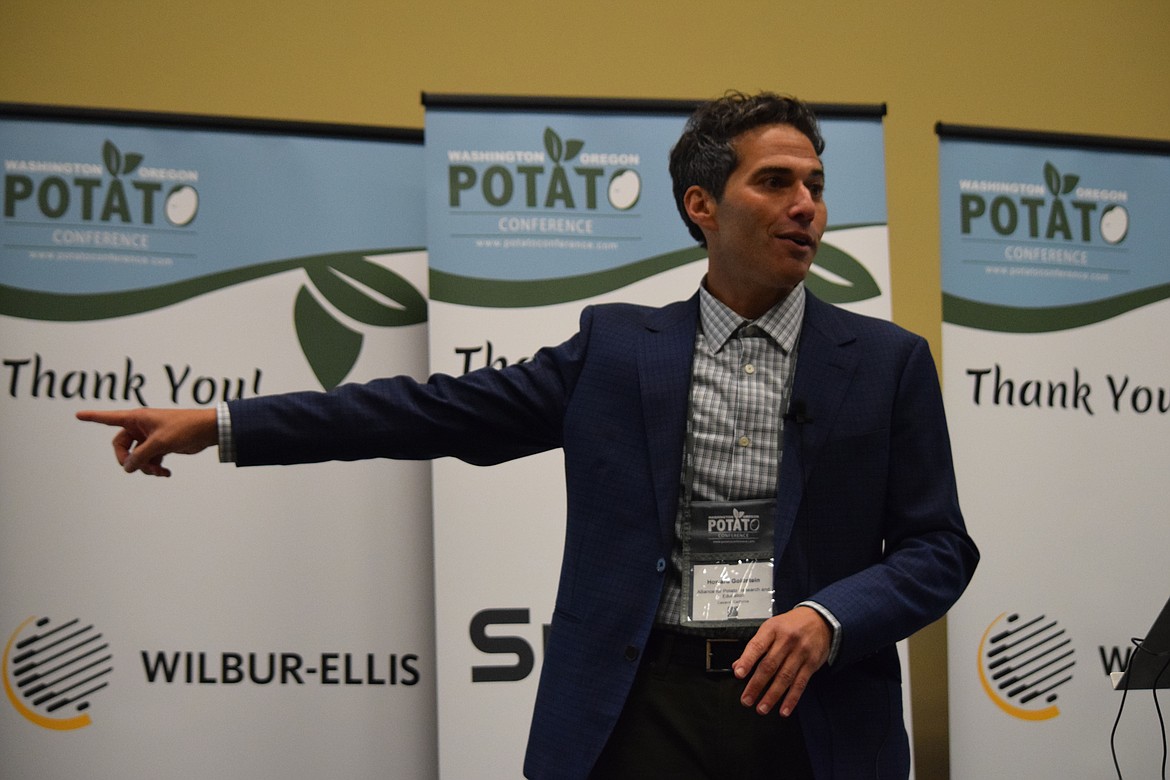‘Good potatoes’
KENNEWICK — It’s a good time to be a potato grower, according to Blair Richardson, CEO of Denver-based Potatoes USA, a national organization that promotes the crop in the U.S. and abroad.
“Remember, demand is strong for potatoes, and is going to continue to be strong for the foreseeable future. It's a great time to be in the industry,” Richardson told attendees during the first day of the Washington-Oregon Potato Conference at the Three Rivers Convention Center in Kennewick.
The annual conference, organized by the Washington Potato Council and the Oregon Potato Council, brings together potato growers, processors, agricultural equipment suppliers and service providers from across the world to highlight the latest in academic research on potato problems, new technologies and products, and just to bring people together who otherwise spend a lot of time out in fields in trucks, on tractors and in storage sheds.
Richardson noted that in the last several decades the U.S. share of the global potato trade has fallen from over half of the market to just under a quarter, U.S. potato exports have doubled.
“We’ve lost market share. But we’ve massively increased the number of pounds we’ve shipped overseas,” he said. “And the reason that has happened is because demand has just kind of gotten out of control around the world.”
Richardson noted that when polled, Americans repeatedly say potatoes are their favorite vegetable, polling well ahead of broccoli, corn and tomatoes.
“So it's a pretty good place to be. If you're in the world of produce, I mean,” he said. “The challenge is to maintain that position. And to build it.”
However, nutritionist and food image consultant Howard Goldstein said potato growers and the organizations that represent them are fighting hard against some eminent nutritionists who have long included potatoes in the same dietary category as refined sugar and processed grains and want government policy on all levels to reflect that view.
“We have a few really influential nutrition scientists and institutions that don't think potatoes are a vegetable,” Goldstein said in his keynote speech.
Goldstein much of this view is based on two ideas. First, the quality of the carbohydrates in potatoes are somehow worse than those found in sugary sweets and processed foods. Second, doing something to potatoes, like frying them and adding salt to them, degrades them nutritionally.
As the U.S. Department of Agriculture and the Department of Health and Human Services work to craft the next version of the Dietary Guidelines for Americans, Goldstein said it’s important for potato growers and their advocates to push back. The final guidelines, which are expected to be published in 2025, will have a tremendous influence on how potatoes are treated in federal food and nutrition programs, like the National School Lunch Program and the Women’s, Infants and Children Program.
“It’s our nutrition Bible,” Goldstein said of Dietary Guidelines for Americans. “All federal programs have to follow the dietary guidelines.”
Goldstein said groups representing potato growers, processors and marketers have had some successes in pushing back and promoting potatoes as an important part of a healthy and balanced diet. For example, he noted a recent study that found people with Type 2 diabetes who ate potatoes for dinner did not experience as big a boost in blood sugar after going to sleep as those who ate basmati rice.
He also noted that in recent draft dietary guidelines, the World Health Organization is recommending that sources of dietary fiber and nutrients like potatoes have proven health benefits.
“We are starting to make changes when it comes to nutrition guidance,” Goldstein said. “We still have work to do … but this is super promising.”
Charles H. Featherstone can be reached at [email protected].

